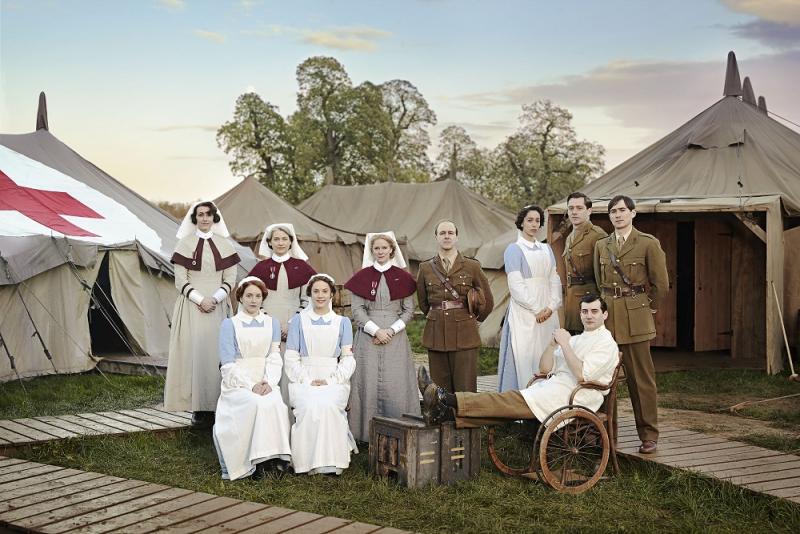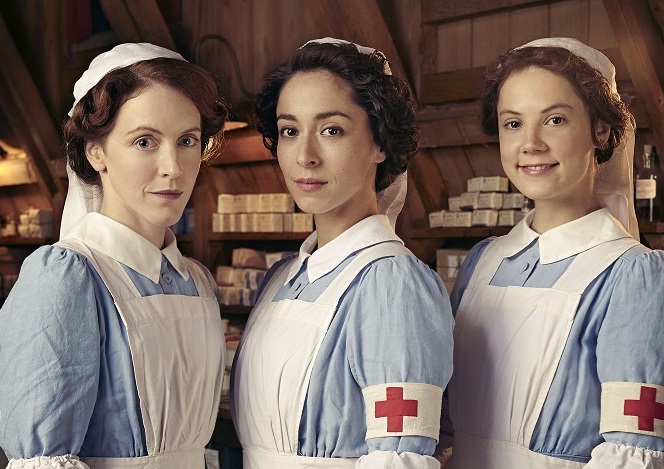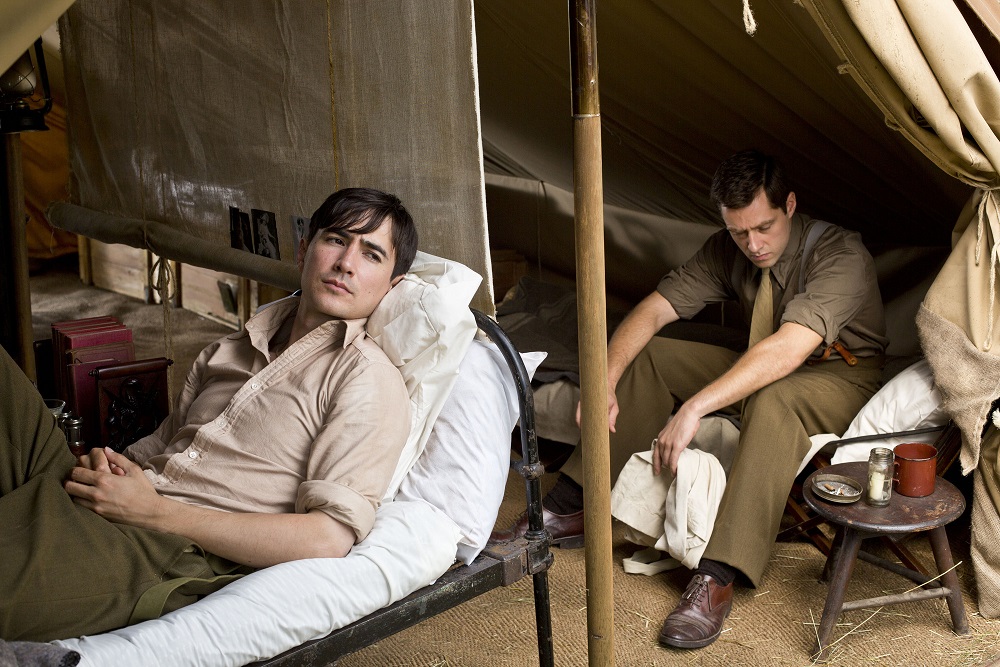The Crimson Field, BBC One | reviews, news & interviews
The Crimson Field, BBC One
The Crimson Field, BBC One
Mental as well as physical wounds in Sarah Phelps's haunting Great War field hospital drama

The BBC is going to reap a rich harvest from The Crimson Field. Sarah Phelps’s drama impresses for a whole number of reasons that will score with viewers: there's the closed community and class elements we know so well from the likes of Downton, as well as rather more room for fermentation of youthful hormones, male and female alike, among a shapely cast.
Most of all though it has the sheer emotionally powerful drama of war, with its stories of life and death that will be resounding throughout this “commemorative” year. The timeline of this opening episode was June 1915, the casualties of conflict already all too evident, its setting a field hospital outside Boulogne, where a trio of Voluntary Aid nurses were arriving to face realities any training they may have received back home certainly hadn't prepared them for.
 They were Rosalie, Kitty and Flora, all warbling away in rarified accents, and they received their first baptism of fire before they even encountered a wounded man. Because they were entering the strict command structure of the professional military nursing service, women who were literally wedded to the work (they were forbidden from marrying). Matron Carter (Hermione Norris) and Sister Quayle (Kerry Fox) have been nursing since at least the Boer War, old colleagues (not so sure that they're friends) whose acquaintance has been disrupted by the former’s unexpected promotion. With this level of strictness they could as well be running the likes of the Irish Magdalene laundries, and washing bloodied bandages is as much part of the job as tending to the wounded (what does a nice Home Counties girl do when severed toes turn up in the laundry basket?). (Pictured above right, from left, Marianne Oldham, Oona Chaplin and Alice St Clair)
They were Rosalie, Kitty and Flora, all warbling away in rarified accents, and they received their first baptism of fire before they even encountered a wounded man. Because they were entering the strict command structure of the professional military nursing service, women who were literally wedded to the work (they were forbidden from marrying). Matron Carter (Hermione Norris) and Sister Quayle (Kerry Fox) have been nursing since at least the Boer War, old colleagues (not so sure that they're friends) whose acquaintance has been disrupted by the former’s unexpected promotion. With this level of strictness they could as well be running the likes of the Irish Magdalene laundries, and washing bloodied bandages is as much part of the job as tending to the wounded (what does a nice Home Counties girl do when severed toes turn up in the laundry basket?). (Pictured above right, from left, Marianne Oldham, Oona Chaplin and Alice St Clair)
But you can be ejected from this community, as Chaplin’s character very nearly was, before she coped with an emergency that elicited sympathy even from her severe matron senior. Yes, even these battle-hardened veterans will get to show their human sides – Phelps has written a very tight script, and such lapses of discipline never become sentimental. The conflicts between by-the-rules strictness and allowing a level of humanity were there in the military command too, never more affectingly than with the trauma of Lance Corp Prentiss (Karl Davies), whose nerves had been shot in a way that more than merited a ticket back to Blighty (mental casualties being every bit as bad as physical ones). His return home was countermanded by a senior officer whose only priority was to get the troops back up line. We'll be hearing more on that score. As for the baggage brought by the nurses, it turned out to be much more than just what was in their suitcases. A fourth nurse played by Suranne Jones appeared before the episode was out, emancipated and on her own motorcycle no less.
 The rotating cast of male characters may be a potential issue – there’s no lingering in this hospital: it’s either straight back to the front, back home, or six feet under. The most promising room for flirtation has come in the form of personable officer surgeons Miles and Thomas (pictured above left, Alex Wyndham and Richard Rankin), who haven’t lost their sense of humour despite the gruesome nature of their duties.
The rotating cast of male characters may be a potential issue – there’s no lingering in this hospital: it’s either straight back to the front, back home, or six feet under. The most promising room for flirtation has come in the form of personable officer surgeons Miles and Thomas (pictured above left, Alex Wyndham and Richard Rankin), who haven’t lost their sense of humour despite the gruesome nature of their duties.
Phelps brings it all together outstandingly, the production values look every bit as good as could be expected, while the score holds back on emphasising elements of tragic drama in order to explore more angular nuance. There are only six episodes in this series, but The Crimson Field looks so good so far that a second instalment must surely already be in the bag.
Add comment
The future of Arts Journalism
You can stop theartsdesk.com closing!
We urgently need financing to survive. Our fundraising drive has thus far raised £49,000 but we need to reach £100,000 or we will be forced to close. Please contribute here: https://gofund.me/c3f6033d
And if you can forward this information to anyone who might assist, we’d be grateful.

Subscribe to theartsdesk.com
Thank you for continuing to read our work on theartsdesk.com. For unlimited access to every article in its entirety, including our archive of more than 15,000 pieces, we're asking for £5 per month or £40 per year. We feel it's a very good deal, and hope you do too.
To take a subscription now simply click here.
And if you're looking for that extra gift for a friend or family member, why not treat them to a theartsdesk.com gift subscription?
more TV
 Murder Before Evensong, Acorn TV review - death comes to the picturesque village of Champton
The Rev Richard Coles's sleuthing cleric hits the screen
Murder Before Evensong, Acorn TV review - death comes to the picturesque village of Champton
The Rev Richard Coles's sleuthing cleric hits the screen
 Black Rabbit, Netflix review - grime and punishment in New York City
Jude Law and Jason Bateman tread the thin line between love and hate
Black Rabbit, Netflix review - grime and punishment in New York City
Jude Law and Jason Bateman tread the thin line between love and hate
 The Hack, ITV review - plodding anatomy of twin UK scandals
Jack Thorne's skill can't disguise the bagginess of his double-headed material
The Hack, ITV review - plodding anatomy of twin UK scandals
Jack Thorne's skill can't disguise the bagginess of his double-headed material
 Slow Horses, Series 5, Apple TV+ review - terror, trauma and impeccable comic timing
Jackson Lamb's band of MI5 misfits continues to fascinate and amuse
Slow Horses, Series 5, Apple TV+ review - terror, trauma and impeccable comic timing
Jackson Lamb's band of MI5 misfits continues to fascinate and amuse
 Coldwater, ITV1 review - horror and black comedy in the Highlands
Superb cast lights up David Ireland's cunning thriller
Coldwater, ITV1 review - horror and black comedy in the Highlands
Superb cast lights up David Ireland's cunning thriller
 Blu-ray: The Sweeney - Series One
Influential and entertaining 1970s police drama, handsomely restored
Blu-ray: The Sweeney - Series One
Influential and entertaining 1970s police drama, handsomely restored
 I Fought the Law, ITVX review - how an 800-year-old law was challenged and changed
Sheridan Smith's raw performance dominates ITV's new docudrama about injustice
I Fought the Law, ITVX review - how an 800-year-old law was challenged and changed
Sheridan Smith's raw performance dominates ITV's new docudrama about injustice
 The Paper, Sky Max review - a spinoff of the US Office worth waiting 20 years for
Perfectly judged recycling of the original's key elements, with a star turn at its heart
The Paper, Sky Max review - a spinoff of the US Office worth waiting 20 years for
Perfectly judged recycling of the original's key elements, with a star turn at its heart
 The Guest, BBC One review - be careful what you wish for
A terrific Eve Myles stars in addictive Welsh mystery
The Guest, BBC One review - be careful what you wish for
A terrific Eve Myles stars in addictive Welsh mystery
 theartsdesk Q&A: Suranne Jones on 'Hostage', power pants and politics
The star and producer talks about taking on the role of Prime Minister, wearing high heels and living in the public eye
theartsdesk Q&A: Suranne Jones on 'Hostage', power pants and politics
The star and producer talks about taking on the role of Prime Minister, wearing high heels and living in the public eye
 King & Conqueror, BBC One review - not many kicks in 1066
Turgid medieval drama leaves viewers in the dark
King & Conqueror, BBC One review - not many kicks in 1066
Turgid medieval drama leaves viewers in the dark
 Hostage, Netflix review - entente not-too-cordiale
Suranne Jones and Julie Delpy cross swords in confused political drama
Hostage, Netflix review - entente not-too-cordiale
Suranne Jones and Julie Delpy cross swords in confused political drama

Comments
On the basis of the first
Brilliant drama, cant
Brilliant series. There MUST
Good Drama, awesome acting!